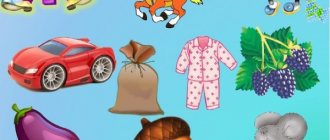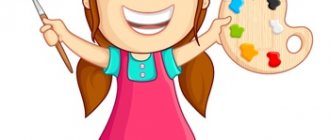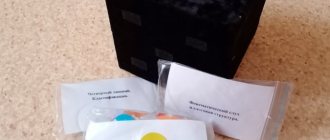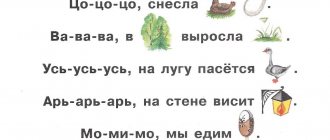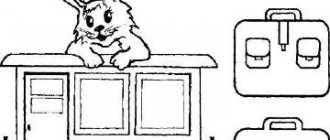Automation of sound L
Automation of the sound L: isolated, in syllables, words and sentences.
Automation of sound starts with the easiest tasks.
Sing the "bell song." Say the sound L for a long time on one exhalation: l-l-l...
Repeat straight syllables with the sound L.
li - le - le - lyu - la
Repeat the reverse syllables with the sound L.
al - ol - ul - yl - il - spruce - yol - yul - yal
Repeat the syllables where the sound L is between the vowels.
ali - ale - ale - alu - ala oli - ole - ole - olya - olya uli - ule - ule - ulya - ulya yly - yle - ylyo - ylyu - ylya. or - yle - ile - ile - ile
Repeat straight syllables with consonant clusters.
kli - kle - kly - klu - klya hli - chle - chle - chly - chly gly - gle - gly - glu - look dly - for - for - for - for fli - fle - fle - flu - flya ate - barely - sl - slyu - slya
Repeat the words where the sound L is at the beginning of the word.
Li: linden, Lida, pour, line, lemon, shower; ruler, larch, Lisa, leaf, fox, face, foliage, leaf fall, elevator. Le: Lena, swan, summer, sculpt, ice drift; lion, forest, fishing line, ribbon, watering can, lollipop, blade, petals, cake, ladder, bream, forester, treat, lie. Lyo: flax, Lyonya, ice, Lyova; light, flying, pilot, pilot, Lyosha. Liu: hatch, people, Lyuba, Luda, buttercup, lupine; favorite La: strap; frog.
Repeat the words where the sound L is in the middle of the word.
Lee: raspberry, viburnum, Polina, Alina, Galina, giant, pelican, Vitalik, valley; gate, snail, peacock, olives, pancakes, clay, stove, skittles, waffles, finch, Vasilisa. Ilya: sprat, pavilion, Ilya, strong. Le: deer, seal, ballet, ticket, log, knee, field, field, Oleg, cart, telephone; beehive, small, felt boots, Valentine, glue, glue, cage. Spruce: dolphin, dumplings, herring, baby squirrel. Le: moth, calf, flight, diaper, ember; maple, film, distant, cornflower, airplane, green, wheels, herring, crossbill, rally, spank, flip-flops. Liu: drinking; baby, squish, dish, beak, watch, salute, salt, prickly, thorn, pole, boat, key, stick, bun, cranberry. Yul: tulip, Yulka. La: clearing, Emelya, week, fields, Olya, Valya, Julia, Kolya, will, sawing, chalking, whitening, Ulya, shoe, drop, flask, look; stroller, heron, saber, hodgepodge. Al: palm tree, coat, battalion, medallion, album, Valka, Alps, Albina, sprat, steel, boy, further, finger, postman, climber. Olga: Olga, only, it hurts, polka, slice. Uhl: gurgle, bags, broth, bulldog, Ulyana, remote control, icicle. Eul: dusty, soap, pollen.
Repeat the words where the sound L is at the end of the word.
Al: enamel, distance, medal, pedal, detail; steel, shawl, festival. Ol: salt, moth, zero. Ul: cul. Il: wick. Eul: feather grass, bottle, bloodworm, dust, reality. Spruce: stranded, spruce, blizzard, report card, jacket, drops, poodle, furniture; hop, tunnel, goal, crack, overcoat, sorrel, schnitzel, jelly, bumblebee, stem, bed. Yule: tulle, July; lobby.
Repeat words with two L sounds.
Lilliputian, lily, Lily; cradle, cartoon.
Repeat the phrases.
Linden alley, heavy rain, green frog, summer shower, lemon wedge, flax cap, maple leaf, lazy seal, butter, salted sprat, spring drops, forest inhabitants, dark tunnel, large field, sticky leaves, light coat, swan's down , small felt boots, plum jelly, large burbot, poplar fluff, sick miller, strong boy, big bumblebee, autumn leaf fall, iron key.
Repeat the sentences.
Three words. In summer the leaves are green. We bought lemons. Swans are flying in the distance.
Four words. Lida's ear hurts. Leaf fall in the autumn forest. There are blue cornflowers in the field. People were getting into the elevator. Tolya was walking in the spruce forest. The flax is turning blue near the forest. The poplar has sticky leaves. Little chickens pecked at the millet. They bought felt boots for little Valya.
Five words. Lena and Yulia bought candy. Lenya was making a plum from clay. Lena and Lida went for a walk. We caught burbot in the shallows. Lupines bloomed in a forest clearing. The baby squirrels were sitting in a hollow linden tree. In autumn, swans fly south. Bumblebees flew over a flower meadow. A lazy seal lies on an ice floe. Snails crawled along the maple branches. Lyuba watered the lilies from a watering can. Lilya was making an orange out of plasticine.
Six words. Swans with their cubs fly over the forest. A small calf was being grazed in a green meadow. Seals with cubs lie on ice floes. Valya and Lena are eating raspberry soufflé. Lucy has raspberries on her plate. Lenya saw swans flying over the forest. Little squirrels were sitting in a large hollow.
Seven words. The fox and her cubs were hunting for little chickens. A deer and a fawn were seen in a forest clearing. Klim and Gleb watered the tulips from watering cans. Ilya and Lyova were caught in a heavy downpour. Yulia and Galya love to skate on ice.
Eight words. Lyova and Lyuba were pushing little Lena on a sled. Tolya’s dad is a pilot, he’s flying today.
Repeat proverbs and sayings.
Prepare a sleigh in the summer and a cart in the winter. The lazy person has no time for everything. He who is lazy is also sleepy. No matter how much a slacker sleeps, he still wants to sleep. Live for people, people will live for you. If you love to ride, you also love to carry sleds. The sun sets - the lazy man is having fun. Don’t feel sorry for your guest, but pour it thicker. Lazy people are too lazy to be lazy. There is honey - go into the hive. There is safety in numbers. A lot of snow means a lot of bread. Where there is snow, there is a trace.
(based on the book by E. N. Spivak, Automation of sound L)
Setting the sounds [L] and [L]
1. Setting [l] mechanically. The mechanical method of setting is a common method used in speech therapy practice;
Using a soft [l] as a base sound, ask the child to repeat the syllable [la] several times, then, using a probe, press the middle part of the back of the tongue downwards - to the right or left, and ask the child to pronounce the combination [la] several times. At the moment of pronunciation, adjust the movement of the probe until the acoustic effect of solid [l] is obtained.
2. When replacing the sound [l] with [l'], it is recommended to set [l] from [s], because in this case, the incorrect sound depends on the tension of the tongue in the anterior-middle part, and not in the back;
In cases of failure, the following techniques can be used: mechanical assistance - with two index and ring fingers, apply light pressure on the neck so that each finger hits a point at the inner edge of the posterior third of the left and right branches of the lower jaw. Suggest creating some tension in the area of the shoulder girdle and neck, for which you need to bend your head forward and in this position pull out the sound [l] as low as possible. It is important to pay attention to the kinesthetic sensations that arise from lifting the root of the tongue.
3. When replacing the sound [l] with the sound [j], the child is taught to hold the tip of the tongue behind the teeth, pressing it firmly against the upper teeth, lower the middle part of the back of the tongue, and tuck the back;
In order for the tongue to take this position, the child is asked to insert the tip of the tongue between the front teeth and say drawn out [s] or, with the mouth open, place a round plastic tube on the middle part of the tongue, and lift the tip of the tongue behind the upper incisors.
4. When replacing [l] with [y], first of all, you need to convey to the child that the lips should not move;
To do this, they suggest looking in the mirror at your lips while repeatedly pronouncing the syllable [la]. Then the adult himself pronounces this syllable and draws the child’s attention to the fact that the lips do not stretch forward, the tongue is visible all the time - it descends from top to bottom. The child is told: “Your lips are naughty. You want them not to stretch forward, but they do it their own way. Let's teach them to obey. We command our lips: stretch forward like a tube!” The child easily performs the movement he is familiar with. “Now stretch your lips as if you are smiling (this will not make it difficult for the child either). You see, your lips have become obedient because you told them what they should do.” The exercise is repeated several times until the child learns to easily switch from one movement to another at a fast pace. “Now let’s work with the tongue. Look what my tongue will do” (The speech therapist raises the tongue by the upper teeth, firmly presses its tip, then lowers it, the lips are always in a smiling position). “Do the same.”
5. When replacing [l] with [v], it is necessary to slow down the movements of the lower lip;
To do this, the child is taught to first lower it, exposing the teeth, and hold it in this position for a count of 3 to 5, then lift it to the upper teeth. These movements are repeated several times. If the child does not succeed, use mechanical assistance, then lower and raise the lower lip with the index finger placed under it.
6. When replacing [l] with [g], practice the position of the tip of the tongue, first between the teeth, then at the upper incisors; The child is shown what is wrong with his pronunciation and how it differs from correct articulation. The speech therapist says: “say la, la, la (the child says “ha, ha, ha”). See how far your tongue has gone? Look where I have it. It is pressed against the upper teeth. Do the same. Say [s], but don’t lower your tongue, but hold it behind your teeth like this.”
7. When pronouncing the sound [l] bilabial or labial-dental, it is necessary to slow down the forward movements of the lips, strengthening the grin of the lips;
If the child does not succeed in this, mechanical assistance is used: they fix the lips in a smile, pressing the corners of the lips with their fingers in the first case, and hold the lower lip with the index finger in the second case.
8. With nasal lambdacism, you should pay attention to the air stream coming out of the mouth on the sides of the tongue.
The child is asked to hold the root of the tongue down and the soft palate at the top in front of the mirror (yawning, raising and lowering the back of the tongue, alternately pronouncing with an open mouth: a-n-a-n...). Then, using the traditional technique, the correct sound [l] is placed. At first, the wings of the nose are pinched.
During the work, the speech therapist can use speech therapy probes or other available materials (probe substitutes) suitable for these purposes. But it is important to ensure the sterility of these items.
Exercises
Differentiation [l], [l] will be more productive if you approach classes as a game. L.A. Komarova developed an original method of individual and group work with preschool children with speech disorders. This method is based on games with cards and flat toys (walkers). Kindergarten children hold a pointer or a Kinder toy in their hands, use auxiliary elements to navigate through cards with pictures, and complete tasks from a teacher or parent.
Puzzles
Adults name the characteristics of objects (external, taste, any others), and the preschooler guesses its name. In this case, the child is presented with options for the correct answer in pictures. For example, the teacher says: “Yellow, sour, oval...” (lemon). The baby points to an object and names it.
What's missing
Exercise develops memory and attention. Place a large card with images of objects on the table (no more than 9 pieces, you can start with 3-4 pictures). The child looks at the card and remembers that it shows 1-2 minutes. Then the teacher covers 1 picture, and the child says what is missing from the field.
Exercises
Let's start with classic exercises that are designed for children of preschool and primary school age. A professional speech therapist and a parent can conduct classes on this list of games at home.
Syllables
This is reading or repeating syllable tables. You need to do the task for 2-3 minutes several times during the day.
In direct syllables:
| LA LA LA | LE-LE-LO | LU-LU-LU | LI-LI-LY |
| LA LA LA | LO-LO-LE | LU-LU-LU | LY-LY-LI |
| LA LA LA | LO-LE-LO | LU-LU-LE | LY-LI-LY |
| LA LA LA | LE-LO-LE | LU-LU-LU | LI-LY-LI |
In reverse syllables:
| AL-AL-AL | OL-OL-OL | UL-UL-UL | EUL-EUL-EUL |
| AL-AL-AL | OL-OL-OL | UL-UL-UL | YL-YL-YL |
| AL-AL-AL | OL-OL-OL | UL-UL-UL | YL-YL-YL |
| AL-AL-AL | OL-OL-OL | UL-UL-UL | EUL-EUL-EUL |
The next step is to add another consonant or vowel to the syllable:
| PLAH-PLAH-PLAH | PLE-PLOE-PLO | PLU-PLU-PLU | PLI-PLI-PLI |
| PLA-PLA-PLA | PLO-PLO-PLO | PLU-PLU-PLU | PLY-PLI-PLI |
| PLA-PLA-PLA | PLO-PLO-PLO | PLU-PLU-PLU | PLAY-PLI-PLAY |
| PLAH-PLAH-PLAH | PLE-PLO-PLOE | PLU-PLU-PLU | PLI-PLI-PLI |
| ALA-ALA-ALA | OLE-OLE-OLO | ULU-ULU-ULU | YLI-YLI-YLY |
| ALA-ALA-ALA | OLO-OLO-OLO | ULU-ULU-ULU | YLY-YLY-YLY |
| ALA-ALA-ALA | OLO-OLO-OLO | ULU-ULU-ULU | YLY-YLY-YLY |
| ALA-ALA-ALA | OLE-OLO-OLE | ULU-ULU-ULU | YLI-YLY-YLI |
It is important not to rush when reading syllables, but to monitor the clarity of the pronunciation of the sound, its softness and hardness.
Words
Use open and closed syllables in words to create speech therapy cards. Form examples in rows of 3-4 pieces each:
Dust - dust - bullet - they sang.
Lyalya – Lolla – Lika – Lena.
Syllable – elephant – clone – full.
Varnish – flag – fist – bench.
Soaped - lathered - washed - swept.
For a number of words, it is important to select examples that sound similar in sound so that the child develops phonemic awareness.
Collocations
The preschooler slowly repeats word combinations after the teacher; increase the complexity of the examples at each lesson, but gradually. If the child cannot cope, does not repeat the words clearly, return to the previous level and practice the material already covered until it becomes automatic.
School ball; Green meadow; Favorite carrot; Toilet soap; Cold floor; Ice puddle; Warm summer; Caught a moth; Ate a lemon; Forest lily of the valley; Gold ring.
Offers
For preschool children, it is enough to include 3-4 words in sentences for repetition.
Our Julia is a fidget. Kolya has a flag. There is a quinoa in the clearing. Planes are flying far away. Kolya pricked stakes. There is an ear in the fist. Lolla and Lika divide everything in half. There is a deer in the field.
On a note! Invite your child to put together sentences independently from the pictures, and then repeat them. For example, put the following set of cards on the table: lemon, elephant, and the written verb loves. It turns out that the elephant (does not) like lemon.
Puzzles
Interesting riddles must not only be guessed, but also memorized.
I dug the ground, I wasn’t tired at all. The one who dug for me is tired. (Shovel)
White on white, trampled where he ran. The red-haired one will pass by and read the tracks. (Fox and hare)
Here are the pins and needles crawling out from under the bed. Their eyes are looking at me, they want to ask for milk. (Hedgehog)
Poems
Poetic texts are an effective method of eliminating speech disorders in children of different ages. For preschool children, suggest learning 1-2 quatrains and large rhyming sketches at least once a week.
It's raining! Drops are dancing in a puddle! The raft is floating! Nobody needs! The little frog climbed onto the raft! And yells: “Hurray! Forward!".
I love blueberries, I love strawberries, I love viburnum, I love strawberries.
There was a blue sky, There was a golden sun, A dog was lying on the porch, A guy was planting a tree. It was quiet and warm. Time passed slowly.
Do not forget to explain to children the meaning of unfamiliar words in poems, texts, and other exercises.
Proverbs
Small proverbs should be read or repeated after an adult:
- Even a small lie leads to a big one.
- Drop by drop the stone is chiseled.
- Don't boast about the beginning, boast about the end.
- The finger is weak, but the fist is strong.
- Finished the job, go for a walk safely.
- The little wolf will shed the tears of a sheep.
- Not all that glitters is gold.
- Slipped is not a fall yet.
After reading proverbs, talk with children about the meaning of the phrase, choose instructive and interesting examples according to the age of the students.
Tongue Twisters
It is better to write pure sayings in a notebook and memorize them. Advise parents to recite such sentences with their child during a walk, before bedtime, or in chorus with the whole family, so as not to turn the game into a strict lesson.
- The nightingale is small, but the voice is strong.
- Lena barely ate; apparently she didn’t want to eat out of laziness.
- And I was there, I heard that story.
- Galya wet her felt boots in the thawed patch. Galenka’s felt boots are drying on the heap.
- Being a housewife is not easy, the milk has run out.
- The linden tree has a linden leaf, the linden leaf is healing and the linden leaf is sticky.
- Right at the shallows we found a large burbot.
Stories
The task involves retelling close to the test. For preschoolers, choose short texts of Russian folk tales and instructive stories.
Masha
Masha was little, but she wanted to grow up faster. I decided to help my mother around the house in order to grow bigger faster. I walked in my mother’s shoes, put on her dress, but nothing helped.
One day Masha decided to sweep and wash the floor. Everyone was happy and surprised. Masha did everything well, and her mother asked: “Masha, have you really become so big that you can wash and sweep the floor?” And dad said: “Yes, but we didn’t even notice that our Masha had grown so much! Now we’ll call her big!”

